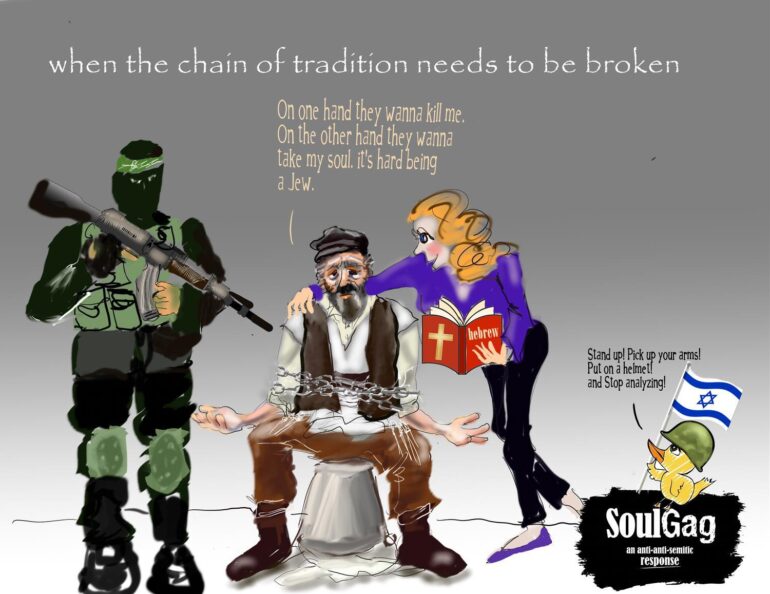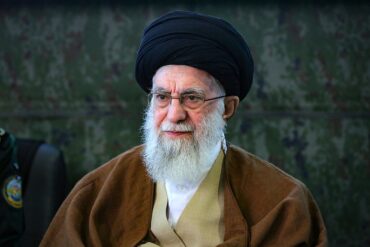What’s in a name? Several weeks ago it was reported that Prime Minister Binyamin Netanyahu (Likud) was not happy with the current name for the war against Hamas.
“Swords of Iron” doesn’t quite do it for him. He’s leaning more towards the “Simḥat Torah War” or the “Genesis War.”
I tend to agree because, whatever one thinks of the prime minister, he does have a firm grasp of Jewish history with its emphasis on heritage and continuity. So, while “Swords of Iron” is a solid, simple name that may have worked well for the Vikings, or Germanic tribes felling the late Roman Empire, we Israelis need to do better and dig deeper.
A Shabbat Simḥat Torah massacre is what we have to try and wrap our heads, hearts and souls around. The dichotomy of juxtaposing the festival of Simḥat Torah with mass slaughter and abysmal atrocities shakes both heaven and earth – and our personal core. What other nation or people dare deal with such unsettling incongruity?
We’ve been on this ride many times before. Pick up a book of Tehillim, read the weekly Torah portion, or the Haftorah, and a strange sense of déjà vu will pass over you.
The barbarity and pain of today takes on Biblical proportions. But whereas others turn to Netflix for their primordial, imaginary fix, we have it in real time and it’s anything but entertaining.
As a mother of soldiers, it’s both eerie and very real to hear my sons speak between themselves and keenly agree that, while fighting in Gaza, they felt as if they were living in a page straight out of TaNaKh.
But it’s reassuring to hear from our soldiers, who are courageous, motivated, fierce and effective fighters, that they lack the blood lust and masochistic and perverted tendencies of our current enemies. And that they can and will get the job done, minus those depraved drives. Because that is who we are.
For some, using the Gregorian calendar to brand the launch of staggering attacks against us like “the ‘73 War” or “October 7th” rather than the “Yom Kippur War” or “Simḥat Torah Massacre” may make things “easier” as it diminishes and neutralizes any hint of Divine linkage. But doing so is an injustice of sorts because it denies the magnitude, meaning and everlasting implications for us as a people. And for us it’s never simple or truly “secular”…
It’s not unusual for living hostages, as well as soldiers’ dismembered bodies and body parts to be put on display by Gazans. During the Second Intifada, we saw heart-wrenching images and footage of our soldiers combing through Gaza’s dunes on their hands and knees trying to retrieve pieces of their comrades. The newspapers were replete with parents crying conflicting cries. Some pleaded: “Please G-d, no soldier should injure a fingernail to get back my son’s ear.” Other demanded: “Return the bones that belong to me. I gave you a whole son, I want all his bones… I don’t have his heart. I don’t even have some of his heart.”
And through it all, incredibly, we never completely lose our awareness of the Other. In the Book of Shoftim, the Song of D’vora recounts the angst of Sisra’s mother as she waits by the window for the return of her son, commander of the Canaanite army. He’s delayed and she’s assured by her handmaidens that he and his men are likely late because they are busy raping and kidnapping young Israelite women and collecting the spoils of war.
Contrast this with the Israeli mother anxiously waiting for her son or daughter to return from the battle field, wondering how many of our lives were saved by his or her heroic actions. And yet come Rosh HaShanah, our shofar denotes the cries of the deeply bereaved mother of Sisra. Because grief and pain over the loss of a child and the sounds of those cries are universal, even though the reasons and motivation may be very different -and sometimes downright evil.
We are a people who can equally lament the tragedy of those children physically slaughtered in the Holocaust and the estimated spiritually lost thousands who, after being given to the church for safe-keeping, were baptized and never returned to their surviving Jewish relatives.
Is it any wonder that the world – friends and foes alike – doesn’t want to actively engage in our perpetual struggle with ultimate questions, impossible moral dilemmas, existential issues, and seemingly intractable challenges? Does anybody really want to understand that?
It’s so much easier to close ears, divert a gaze… and to hate. Those who are more pro-active have taken to tearing down hostage posters, ripping off shtreimels, rioting, riding roughshod over the term “genocide” or offering new testament tracts as solutions to their Jewish problem.
“Save me from the hand of my brother, from the hand of Esav, for I am afraid of him, lest he come and strike me, [and strike] a mother with children…” Seems, according to our sages, that brotherly love from those who purport to support us can be worse than the physical bite of our enemies.
I’m not sure why Israel’s hasbara experts and Jewish activists spend excessive time, energy and resources trying to get the world to understand us. The more pressing and relevant matter at hand is that we don’t understand the world. And maybe that’s because many of us have yet to understand ourselves and where we are standing at this particular juncture in history. We are indeed engaged in a terrestrial and celestial battle for our very existence. Our forefathers and foremothers understood that this is how Jews navigate the world.
But have we found our footing yet? Until we do, we seem to be grasping at some pretty strange straws.
Case in point: The unrelenting tug of war over the identity of Jesus on mainstream and social media is a viral, painful embarrassment. It’s not unlike a virtual crucifixion, with each team fiercely pulling an arm of Christianity’s icon. Why the Jews feel the need to give credence to, acknowledge and legitimize Jesus in order to “save” Christian history from being kidnapped and ravaged by the Arab propaganda machine is beyond bizarre. And why Palestinians and their allies and supporters claim Jesus as their own while simultaneously trashing nativity scenes, violently disrupting Christmas pageants and firing missiles at a church in the Holy Land is beyond blasphemous. Except that neither the Jews nor the Muslims attributes divinity to Jesus. So, the whole thing is more absurd than irreverent.
Yet there has never been a time where Jews have voluntarily spent more time courting Christians and paying more homage to Christmas and the Christian savior.
The big question is why have so few of the 2.4 billion Christians worldwide stepped up to the plate to defend their theological records? Do they even care? Or is there perhaps some vicarious enjoyment being derived from a confrontation that actualizes the world evangelical agenda? It’s generally been “silent night” save for the missionaries who portray both Jews and Muslims as suffering and vulnerable peoples in need of “saving.”
Media reports speak of immense support for Israel during this crisis from evangelical Christian and messianic sources, while noting that some of these same entities are taking advantage of the war situation in targeted missionary campaigns aimed at Israel’s soldiers, evacuated families, families of hostages and other vulnerable sectors.
The debate has spilled over onto social media forums, where messianic missionaries are quick to remind Israelis that they too are fighting and dying for the Jewish state. With responses being along the lines of “serving in the IDF, paying taxes and being a good citizen does not give someone the right to falsely declare themselves Jewish and work to tear our people away from their faith.”
Until this convoluted identity charade is exposed for what it is, it will continue to be a spiritually menacing and growing thorn in our sides that has been haunting us from time immemorial.
According to our sages, the nation of Amalek, with its relentless and eternal hatred of Israel, draws its strength to launch surprise attacks and prey upon the weak and vulnerable when the nation of Israel’s hands become weakened through abandonment of the path of Torah.
Every generation is vulnerable to Amalek’s attacks when idolatry (foreign worship) is present in Israel. I’m not making this stuff up (see Rav Eliyahu KiTov’s classic “Book of our Heritage”). Because we as a people believe that nothing just randomly happens per chance, Shabbat Simḥat Torah 5784, rather than October 7th 2023, demands our collective introspection and rectification.
I’m pinning my hope on Generation Z with their authenticity, creativity, and spirit.
At one time dismissed as the “Tik-Tok generation,” our young people are bona fide native Israelites in heart, mind and soul and many have managed to drop the Galut baggage that we’ve all been shlepping with us from years under Diaspora influence. But they haven’t dropped their grandparents or their heritage, rather they are committed to remembering and to repairing.
Acutely aware that they are living a significant chapter in Israel’s history, they can stand-up and speak their truth. We may hope that they will cleanse the mindset and the stains that have been tormenting and delaying the older generations from assertively upholding our identity and firmly securing our spiritual and physical sovereignty in our land.





